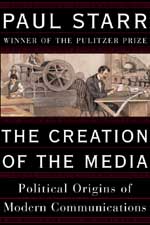Paul Starr's Princeton homepage
The Creation of the Media
 |
Winner of the 2005 Goldsmith Book Prize. |

From the book jacket
America's leading role in today's information revolution may seem simply to reflect its position as the world's dominant economy and most powerful state. But by the early nineteenth century, when the United States was neither a world power nor a primary center of scientific discovery, it was already a leader in communications-in postal service and newspaper publishing, then in development of the telegraph and telephone networks, later in the whole repertoire of mass communications. In this wide-ranging social history of American media, from the first printing press to the early days of radio, Paul Starr shows that the creation of modern communications was as much the result of political choices as of technological invention. With his original historical analysis, Starr examines how the decisions that led to a state-run post office and private monopolies on the telegraph and telephone systems affected a developing society. He illuminates contemporary controversies over freedom of information by exploring such crucial formative issues as freedom of the press, intellectual property, privacy, public access to information, and the shaping of specific technologies and institutions. America's critical choices in these areas, Starr argues, affect the long-run path of development in a society and have had wide social, economic, and even military ramifications. The Creation of the Media not only tells the history of the media in a new way; it puts America and its global influence into a new perspective.
Reviews and commentary
"Daring and dazzling. No other work has integrated the history of communications so thoroughly, and no other work is likely to do so any time soon. Paul Starr's book is deeply informed by a rich comparative knowledge of the development of the media in other parts of the world. A major intellectual achievement, an indispensable work."— Michael Schudson, author of Discovering the News
"Once we understand the media in Starr's terms, we have to start caring about what those lobbyists who stand in the corridor outside the Senate Commerce Committee hearing room actually do."— Nicholas Lemann, The New Yorker, April 12, 2004.
“Original and compelling..” –James Fallows, New York Times Book Review, May 30, 2004.
“The Creation of the Media is a remarkable achievement—a comprehensive trans-Atlantic account of the rise of mass communications … not a simple tale of triumph … subtle and qualified, and shrewdly ambivalent in its dénouement.” Jackson Lears, The New Republic, July 26, 2004.“The Creation of the Media provides the grand synthesis of the history of journalism and communications that has been needed for a long time. Starr writes with verve and authority ….” –David Nasaw, author of The Chief
"Paul Starr has produced a book that many historians of communication have called for. Written with a broad readership in mind, it is simply the best available synthesis of the largest range of topics relevant to the history of the media. Moreover, it advances a strong argument that has encouraging policy implications. It is a major accomplishment by an important thinker." John Nerone, Journal of American History, March 2005.
"profound and illuminating ... The Creation of the Media is densely written, deeply researched, and subtly argued. Starr’s historical analysis — which embraces ideas, institutions, and politics — stretches from the pamphleteers of the sixteenth century in Europe to the radio broadcasting networks of twentieth century America. His subject is always broader than journalism, and he ranges from newspapers to the telegraph to telephones to movies to radio. But he never loses sight of how the larger media system, and the political and economic tendencies of an era, establish the context that offers greater and lesser possibilities for journalism." Robert W. Snyder, Columbia Journalism Review (July/August 2004).
“The Creation of the Media is first and foremost a sweeping narrative history of American media from the Revolution to World War II. And it is the best such history ever written. … This is truly a case where the whole adds up to much more than the sum of its parts.” David Paul Nord, The Book, July 2004
“A creative, illuminating history.” David Greenberg, Newsday.
"Do you think that America's media structure is dictated by technology and innovation? Paul Starr will make you think again. He demonstrates that, from the beginning, political choices have been central to our system of communications. Fascinating, sharp, and comprehensive-and full of surprises."— Cass R. Sunstein, author of The Second Bill of Rights
"This is a book no journalist-and probably, no citizen-should be without."— New York Sun, April 7, 2004.
"[An] engrossing, panoramic history of the development of American media...sweeping and authoritative."— Publishers Weekly

Interview with Brooke
Gladstone, "On the Media," April 30, 2004. Interview with Bob McChesney, "Media Matters," April 25, 2004.
http://journalism.berkeley.edu/events/details.php?ID=161
Talk on The Creation of the Media ,
Graduate School of Journalism, University of California, Berkeley, January 26, 2005.
"Is the Press Still the Fourth Estate in America?" National Press Club, March 30, 2007.
"The Future of News,"Princeton University`s Center for Information Technology Policy, May 14, 2008.
Radio Interviews
Video
Last modified, November 1, 2008
starr@princeton.edu